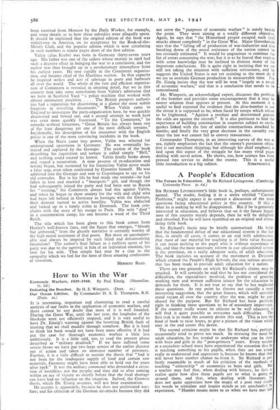How to Win the War
Defeating the Bomber. By H. E. Wimperis. (Dent. is.) Our Ocean Lifeline. By Commander D. S. E. Thompson, R.N. (Dent. is.)
IT is interesting, important and chastening to read a careful analysis of our faults in the application of economic warfare, and there cannot be any doubt that most of it is well founded. During the Great War, until the last year, the loopholes of the blockade were not efficiently stopped, and it is very useful to have Dr. Einzig's warning against the besetting British fault of trusting that we shall muddle through somehow. But it is hard to think his book would not have been more effective if it had put the case for thorough economic warfare a little less ambitiously. It is a little odd, too, to read the present phase described as " military deadlock." If we have suffered some severe blows we have put two large armies of the earlier dictator out of action and taken an immense number of prisoners. Further, it is a little difficult to sustain the thesis that " had it not been for the inadequate supply of food and certain raw materials, Germany might have been able to hold out for years after 1918." It was the military command who demanded a cessa- tion of hostilities, not the people; and they did so after coming within an ace of victory so shortly before that the food shortage can have had no influence on the situation. Indeed, the German thesis, which Dr. Einzig assumes, will not bear examination.
He accepts it, apparently, because he does not understand war- fare; and his criticism of the German air-attacks because they did
not serve the " purposes of economic warfare " is surely beside the point. They were aiming at a totally different objective. Again, he says that " the Hinterland proper escaped such (air) attacks almost completely " in the Great War. Major Grosskreutz says that the " falling off of production of war-industries and also breaking down of the moral resistance of the nation cannot be too seriously estimated." It would be ungracious to continue the list of errors concerning the war; but it is to be feared that readers with some knowledge may be inclined to distrust many of his important conclusions. He is quite right in insisting that we are still not taking the situation with sufficient seriousness, and he suggests the United States is not yet assisting as she must do if we are to overtake German production in measureable time. For Dr. Einzig insists that the war will be won " largely as a result of economic warfare," and that is a conclusion that needs to be remembered.
Mr. Wimperis, an acknowledged expert, discusses the problem of the bomber and provides some encouragement that it may be nearer solution than appears at present. At this moment it is useful to find repeated the evidence that the dive-bomber is not the threat it is supposed to be, when faced by troops which refuse to be frightened. " Against a resolute and determined gunner the odds are against the aircraft." It is also pertinent to find the experience of building construction in countries subject to earth- quakes linked with the fate of similar constructions attacked by bombs; and finally the very great decrease in the casualty rate since the last war cannot fail to convey reassurance.
Commander Thompson, in an interesting survey of the war at sea, rightly emphasises the fact that the enemy's persistent objec- tive is our merchant shipping; but although his chief emphasis is laid upon this aspect of the struggle he has many vivid pages dealing with naval action. He shows, too, how science has been pressed into service to defeat the enemy. This is a useful
little introduction to a big subject. STRATEGICUS.






























 Previous page
Previous page